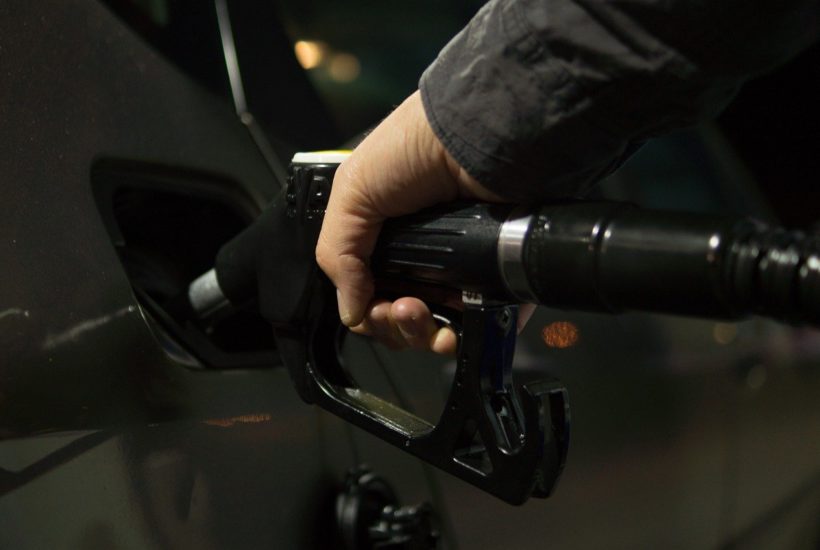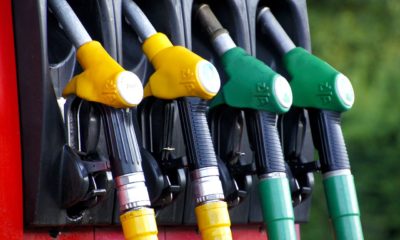Business
Gasoline and Diesel Fuels to Further Increase in Spain After Rising 24% Last Year
The cost of gasoline and diesel fuels in Spain has increased as much as 24% last year. Repsol gas stations in the Community of Madrid set the price of 95 gasoline at $1.77 (€1.45) per liter, while diesel remains at $1.57 (€1.29). These prices are similar to those of Cepsa service stations. The liter of 95 gasoline is fixed at $1.81 (€1.48), while diesel is $1.6 (€1.31).

Spaniards are now paying for the increase in the price of electricity, which is now at historic highs after a May with the kilowatt going through the roof. However, it is not only the electricity bill that has risen. The cost of fuels has been rising since the beginning of the year, but the increase in the price of oil derivatives has been occurring since the end of the confinement, just one year ago.
Specifically, the cost of gasoline for users has increased by 24% since the same week last year with respect to this halfway point of 2021. According to data provided by the European Union Oil Bulletin, gasoline in Spain stands at $1.65 (€1.35) per liter. Just a year ago, the same amount stood at $1.33 (€1.09).
So far this year, the average price of a liter of gasoline has risen by 12.6%, while that of diesel has risen by more than 11.5%. The same happens with diesel, a petroleum derivative on which more taxes will be levied because it is more polluting. Specifically, diesel has gone from costing $1.11 (€0.91) in the first week of June last year to $1.48 (€1.21), which is the European Union’s Oil Bulletin, which is updated every week.
Read more on the subject and find the latest economic news with our companion app Born2Invest.
However, the price set at some gas stations is much higher
Repsol gas stations in the Community of Madrid set the price of 95 gasoline at $1.77 (€1.45) per liter, while diesel remains at $1.57 (€1.29). These prices are similar to those of Cepsa service stations. The liter of 95 gasoline is fixed at $1.81 (€1.48), while diesel is $1.6 (€1.31).
This scenario has resulted in us seeing mid-2019 digits, a time when fuel prices usually rise due to higher demand thanks to summer travel. In addition, they have now surpassed pre-coronavirus pandemic levels, a time when they plunged due to low demand from severe confinement in almost the entire world.
The Organization of Consumers and Users (OCU) recently warned that, if this upward trend in the fuel market continues, it could mean an extra cost of $219 (€180) for car users in Spain.
It should be remembered that the end customer has to pay more than 50% in taxes. Other fixed costs such as reserves, storage, and marketing of gasoline and other petroleum products also play a role.
Oil prices expected to skyrocket in Spain this summer
But far from solving the problem, a summer with sky-high prices is predicted, so filling up the tank to enjoy the vacations will be more expensive than in other years. A perfect storm is raging over Brent barrels, the benchmark in Europe, and West Texas Intermediate (WTI), the benchmark in the United States.
Joe Biden, President of the United States, signed an executive order this Tuesday, June 1st, to suspend oil and gas leases in the Arctic National Wildlife Refuge, so drilling for crude oil will be banned. It should be recalled that Donald Trump gave the go-ahead for this technique, home to hundreds of thousands of caribou and migratory waterfowl, as well as polar bears in the southern Beaufort Sea, just half a month before the new White House tenant took office.
Drilling in this region is essential for the United States because it is one of the country’s supply routes, and the world power would have to rely on imports to meet demand.
On the other hand, the OPEC+ countries, an association of the main oil extracting countries, agreed on the new bases of the road map for the normalization of the sector’s markets. Thus, the cartel decided to increase pumping by 2.1 million barrels per day. Months ago, at the height of the collapse in the price of crude -which reached negative levels- the cartel agreed to reduce its production by almost ten million barrels a day in order to increase the price.
Analysts estimate that the price of Brent crude will reach $80 a barrel in the coming months. At the close of the European markets, Brent rose by 1.24% and its price rose to $71.13. For its part, WTI registered increases of 1.36% ($68.65).
A framework that is not very conducive to discounts
The regulatory framework is also not helping the price of gasoline and diesel to fall. The price for emitting carbon dioxide emissions in Europe is at an all-time high $61 (€50 per ton).
Arianna Fox, European equity analyst at Schroders, explains that “rising carbon prices make energy from fossil fuels more expensive. At the same time, it makes green energy – such as wind or solar – more competitive, which should encourage a change in the behavior of consumers and suppliers”.
On the other hand, this Tuesday the Council of Ministers approved the National Fund for the Sustainability of the Electricity System (FNSSE), which aims to eliminate the cost of financing the electricity bill, which is paid directly by consumers on a regular basis. Now, it will be the energy companies that will assume these charges and it will be the companies that emit the most CO2 emissions that will have to contribute the most to the piggy bank. The Government, according to its forecasts, wants to collect up to $8.5 billion (€7 billion).
The National Commission for Markets and Competition stated in a recently published report that this distribution will have an impact on the final price of energy consumers, to the extent that gas and electricity marketers, wholesale operators and distributors of LPG and petroleum products will transfer this cost or part of it to the final price paid by the consumer.
Depending on the scenarios handled by the institution headed by Cani Fernández, end consumers in the year 2025 could be bearing an expense in liquid hydrocarbons higher than the current one by more than four euro cents per liter or more than six euro cents per liter.
At the same time, the Government is proposing other taxes on fossil fuels. In the ‘Recovery and Resilience Plan’ sent to Brussels recently, the Executive explains that it wants to review taxes on gasoline or diesel.
“The bonuses on hydrocarbons used as fuel will be reviewed. The objective is to deepen in the design of green taxation that contributes to sustainability, protecting the environment as a tool to fight against climate change and also to meet the commitments assumed internationally,” is extracted from the text sent to the European Union.
__
(Featured image by Skitterphoto via Pixabay)
DISCLAIMER: This article was written by a third party contributor and does not reflect the opinion of Born2Invest, its management, staff or its associates. Please review our disclaimer for more information.
This article may include forward-looking statements. These forward-looking statements generally are identified by the words “believe,” “project,” “estimate,” “become,” “plan,” “will,” and similar expressions. These forward-looking statements involve known and unknown risks as well as uncertainties, including those discussed in the following cautionary statements and elsewhere in this article and on this site. Although the Company may believe that its expectations are based on reasonable assumptions, the actual results that the Company may achieve may differ materially from any forward-looking statements, which reflect the opinions of the management of the Company only as of the date hereof. Additionally, please make sure to read these important disclosures.
First published in EL INDEPENDIENTE, a third-party contributor translated and adapted the article from the original. In case of discrepancy, the original will prevail.
Although we made reasonable efforts to provide accurate translations, some parts may be incorrect. Born2Invest assumes no responsibility for errors, omissions or ambiguities in the translations provided on this website. Any person or entity relying on translated content does so at their own risk. Born2Invest is not responsible for losses caused by such reliance on the accuracy or reliability of translated information. If you wish to report an error or inaccuracy in the translation, we encourage you to contact us.

-

 Africa4 days ago
Africa4 days agoFrance and Morocco Sign Agreements to Boost Business Mobility and Investment
-

 Impact Investing2 weeks ago
Impact Investing2 weeks agoItaly’s Listed Companies Reach Strong ESG Compliance, Led by Banks and Utilities
-

 Fintech21 hours ago
Fintech21 hours agoFindependent: Growing a FinTech Through Simplicity, Frugality, and Steady Steps
-

 Impact Investing1 week ago
Impact Investing1 week agoCDP Approves €1.5 Billion Package to Boost Industry, Renewables, and International Development
























